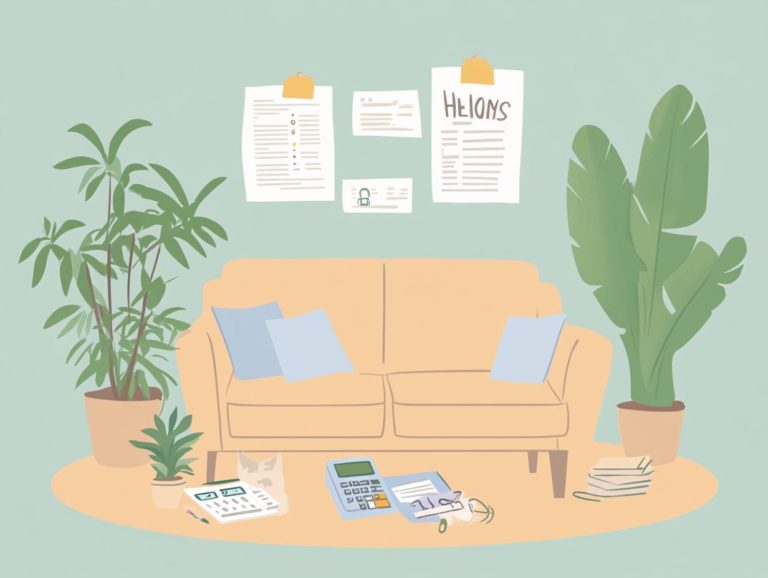How to Find the Best Home Insurance Type
Home insurance is not merely a safety net; it serves as an essential shield for your most valuable asset your home.
With a multitude of coverage options available, ranging from basic plans to comprehensive packages, selecting the right policy can feel overwhelming.
This guide delves into various types of home insurance, key factors to consider when choosing a policy, and offers tips for comparing options and saving on premiums.
Whether you re a new homeowner or reassessing your current coverage, this information will empower you to make a well-informed decision.
Contents
- Key Takeaways:
- Types of Home Insurance
- Factors to Consider when Choosing Home Insurance
- Comparing Home Insurance Policies
- How to Save Money on Home Insurance
- Frequently Asked Questions
- What is the importance of finding the best home insurance type?
- What factors should I consider when looking for the best home insurance type?
- How can I determine the coverage limits I need for my home insurance?
- What are the different types of home insurance policies available?
- How can I find the best home insurance type for my specific needs?
- Are there any discounts available for home insurance?
Key Takeaways:

- Understand the difference between basic and comprehensive coverage.
- Consider risk factors and coverage options when choosing a policy.
- Explore ways to save on premiums.
What is Home Insurance?
Home insurance, commonly known as homeowners insurance, is an essential safeguard for your home and personal belongings against various risks, such as natural disasters, theft, and liability claims.
This type of coverage provides financial security and peace of mind, allowing you to repair or rebuild your home if misfortune strikes.
It also protects you from potential legal liabilities that could arise from accidents on your property.
Understanding different insurance policies is crucial for securing the right coverage and protecting your investment.
Homeowners insurance typically extends to your personal belongings and covers liability for injuries that occur on your property.
It may also cover additional living expenses if you find yourself temporarily displaced.
Evaluating options like dwelling coverage, personal property coverage, and loss of use is vital.
Understanding your claims history can impact your premium costs and guide you toward policies that suit your lifestyle and location.
Incorporating liability insurance into your policy addresses any legal expenses that may arise from unexpected incidents, underscoring the importance of comprehensive home insurance.
Types of Home Insurance
When navigating the insurance marketplace, it’s crucial to grasp the understanding homeowners insurance types available, each tailored to different homeowner needs and risk profiles.
From basic policies that cover essential property damage to comprehensive plans that offer extensive protection, you need to make a wise choice to ensure you have sufficient coverage.
Understanding the distinctions between current value of your property and replacement cost coverage is vital in pinpointing the best option for your individual requirements.
Basic Coverage vs. Comprehensive Coverage
Basic coverage typically protects you against a limited set of perils, such as fire, theft, and vandalism.
In contrast, comprehensive coverage offers a broader safety net that includes risks like floods and earthquakes.
Understanding the distinction between these coverage types is crucial, as it can significantly impact your financial security when a claim arises.
Comprehensive policies often feature higher coverage limits, making them attractive for those seeking complete peace of mind.
The differences between basic and comprehensive coverage can affect your premium costs and how secure you feel in your home.
While basic coverage may catch your eye with its lower price tag, it leaves gaps that could lead to hefty out-of-pocket expenses in unexpected events.
In contrast, the wider nature of comprehensive policies can provide reassurance that many more disasters are covered, including personal property replacement and liability issues stemming from accidents on your property.
Being aware of the claims history in your area can help you choose the right policy.
Certain regions might have higher instances of claims related to specific risks, influencing your coverage options and premium rates, allowing you to make a more informed decision.
Additional Types of Home Insurance

Along with your standard homeowners insurance, there are specialized policies designed to address specific risks that traditional coverage might overlook.
Think about flood insurance, windstorm insurance, and hail insurance. These specialized home insurance types are a must-have for homeowners, especially if you’re in a risk-prone area! It’s also important to know what to look for in home insurance coverage to ensure you’re fully protected.
They ensure that you re adequately protected against losses that could otherwise lead to significant financial strain.
Plus, liability insurance and umbrella policies provide extra layers of protection, safeguarding you against legal claims that might arise from accidents on your property.
It’s vital to understand the details of each policy, particularly since coverage specifics can vary widely. For example, flood insurance not only helps mitigate financial losses from rising water, but it s often a requirement for those living in designated flood zones as established by the National Flood Insurance Program.
This program also ensures that your rights as a policyholder are upheld, allowing you to challenge any claims determinations if necessary.
Similarly, windstorm insurance can be invaluable if you reside in hurricane-prone areas, covering wind-related damages that standard homeowners policies may leave out.
By exploring these specialized coverage options, you can make informed decisions that significantly enhance your overall risk management strategy.
Factors to Consider when Choosing Home Insurance
Selecting the ideal home insurance policy demands thoughtful reflection on several crucial factors that impact both your coverage and premium costs, including understanding how to identify reliable home insurance providers.
Your location plays a pivotal role, as different areas present varying degrees of risk from natural disasters, theft, and liability claims. By grasping these risk factors, you can better identify the coverage options that suit your situation.
Working with knowledgeable insurance agents offers valuable insights into the types of policies available and potential discounts, giving you the power to make well-informed decisions tailored specifically to your needs.
Location and Risk Factors
The location of your home is crucial in determining the right home insurance coverage, as it comes with its own set of risk factors, such as natural disasters, crime rates, and environmental hazards. To navigate these considerations effectively, you may want to learn how to research home insurance providers online.
If you re in an area susceptible to floods or earthquakes, you might find that specialized policies, like flood insurance or earthquake coverage, are essential to adequately protect your property.
By understanding how these risk factors affect insurance rates, you can make informed decisions when selecting coverage options that truly fit your unique situation.
For example, living in a neighborhood with high crime rates may lead to higher premiums because of the increased risk of theft or vandalism. In this case, you ll want to ensure your coverage includes personal property protection.
Likewise, if you’re in a region that regularly faces severe weather hurricanes or wildfires, for instance you may need to look into additional coverage options, known as endorsements, or comprehensive plans designed specifically for those risks.
Market assistance programs can offer valuable insights into these regional differences, helping you assess your insurance needs more effectively.
By recognizing the nuances of your environment, you can secure tailored solutions that not only satisfy regulatory requirements but also provide you with much-needed peace of mind.
For more personalized advice, consult your insurance agent to explore options tailored to your needs.
Cost and Coverage Options
Evaluating the cost of home insurance is essential for you as a homeowner, as it directly affects your financial planning and overall coverage choices.
Different coverage options come with varying monthly costs (premiums), and understanding the relationship between coverage limits, deductible amounts (the amount you pay out-of-pocket before insurance kicks in), and these premiums enables you to find the best fit for your budget. Knowing about potential discounts for home improvements, like installing fire alarms or sprinkler systems, can help you reduce costs without sacrificing necessary coverage.
Your claims history can influence your premiums and your eligibility for specific coverage options. If you maintain a clean claims record, you may unlock better rates, while a history of previous claims could lead to higher costs.
This interplay between costs and coverage shapes your insurance policy, underscoring the importance of analyzing your unique situation. By balancing these factors wisely, you can secure optimal protection while sticking to a sustainable budget.
Comparing Home Insurance Policies

When comparing home insurance policies, analyze offerings from various companies and consider understanding the differences in home insurance types. This helps you find the best price and coverage options for your needs.
Evaluating multiple policies provides insight into coverage limits, exclusions, and additional benefits each insurer presents. Working with independent agents can simplify this process; they offer expert guidance to help you find policies that align with your budget while ensuring comprehensive protection against potential risks.
Key Features to Look For
When evaluating home insurance policies, focus on key features that matter to you. Start by examining the scope of coverage options available and check how to navigate home insurance providers’ policies to understand the claims process.
Understanding coverage limits and exclusions is crucial make informed decisions about the protection you truly need. Investigate the types of events covered, such as natural disasters, theft, or liability, as unexpected incidents can lead to financial strain.
A straightforward and efficient claims process is a must; you should be able to report damages and receive support without unnecessary delays. Evaluating the quality of customer service is also key; an insurer prioritizing communication and assistance enhances your peace of mind.
Finally, be aware of your rights as a policyholder and the availability of market assistance to ensure fair treatment and adequate support while navigating your insurance options.
How to Save Money on Home Insurance
Saving money on home insurance is a common goal for homeowners. There are effective strategies to help you achieve this while ensuring adequate coverage.
Leverage available insurance discounts, such as those for home improvements like installing fire alarms or upgrading construction materials. These measures can significantly reduce your premium costs.
Consider bundling your insurance policies or increasing your deductible amount; both can lead to lower expenses without compromising essential coverage. Don’t miss out on savings!
Tips for Lowering Premiums
You can lower your home insurance premiums with smart strategies. This allows you to keep necessary coverage while saving money.
One effective tactic is increasing your deductible. This means you’ll pay more out-of-pocket if you make a claim, so choose an amount you can handle.
You can also take advantage of insurance discounts. Installing safety features like fire alarms or security systems can significantly reduce your costs.
It’s wise to regularly review your insurance policy. Make sure it reflects any changes in your home’s value or improvements you make.
Keeping a clean claims history is key. Fewer claims typically lead to lower premiums.
Stay proactive to find the perfect balance between deductibles and coverage. This ensures peace of mind without breaking the bank.
Frequently Asked Questions

What is the importance of finding the best home insurance type?
Finding the best home insurance type is crucial as it helps protect your most valuable asset and provides financial security in case of unforeseen events such as natural disasters, fires, or theft. To make an informed decision, consider the top considerations for home insurance types.
What factors should I consider when looking for the best home insurance type?
Some key factors to consider include your budget, coverage limits, deductibles, the reputation of the insurance company, and the level of customer service provided.
How can I determine the coverage limits I need for my home insurance?
To determine the coverage limits you need, consider the value of your home and its contents, any potential risks in your area, and the cost of rebuilding your home in case of damage.
What are the different types of home insurance policies available?
The main types of home insurance policies include HO-1, HO-2, HO-3, HO-5, and HO-8. Understanding the impact of location on home insurance types is essential, as HO-3 is the most common type and provides coverage for your home’s structure and personal belongings against a wide range of perils.
How can I find the best home insurance type for my specific needs?
To find the best home insurance for your specific needs, compare quotes from different insurance companies, read customer reviews, and consult with a licensed insurance agent who can provide personalized recommendations. For more detailed guidance, check out this guide on finding the best home insurance based on your budget and coverage needs.
Are there any discounts available for home insurance?
Yes, most insurance companies offer discounts for home insurance policies. Common discounts include bundling your home and auto insurance, installing safety features, and maintaining a good credit score.
Contact an agent today for personalized insurance advice or to check your current policy!






